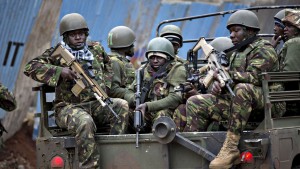Kenyan President Uhuru Kenyatta warned Somalia’s al-Qaeda-linked Shebab fighters his government will respond to their killing of almost 150 students in the “severest way” possible.
Condemning the “barbaric medieval slaughter” in his first address since the attack ended on Thursday, the bloodiest assault by the Shebab militants, Kenyatta declared three days of national mourning.
“My administration shall respond in the severest way possible to the attack and any other attack to us,” Kenyatta said, in a televised national address from the capital Nairobi.
“Thursday wounded Kenya, Thursday wounded families, friends and communities of the victims of the attack.”
The day-long seige on Garissa University, situated near the border with Somalia, claimed 148 lives, including 142 students, three police officers and three soldiers.
The massacre was Kenya’s deadliest attack since the 1998 bombing of the US embassy in Nairobi.
Kenyatta’s speech, two days after the attack ended, came hours after the militants vowed more strikes against Kenya, in revenge for Nairobi’s sending troops into southern Somalia in 2011. Kenya is now fighting alongside the African Union force battling the Shebab.
“We will… stop at nothing to avenge the deaths of our Muslim brothers until your government ceases its oppression and until all Muslim lands are liberated from Kenyan occupation,” the Shebab said in a statement released on Saturday.
“Until then, Kenyan cities will run red with blood… this will be a long, gruesome war of which you, the Kenyan public, are its first casualties.”
Kenyatta however dismissed the threats.
“Despite adversity, we have been — and always will be — unbowed and we shall continue to build a strong prosperous and secure nation,” he said.
“That is the greatest testament we can offer to those precious departed we have lost.”
But Kenyatta also warned that the terrorist masterminds were inside Kenya, not Somalia.
“The planners and financiers of this brutality are deeply embedded in our communities”, he said, warning that “radicalisation is happening openly” in Islamic Madrassa schools by “rogue” preachers.
“We will not allow them to continue their lives as normal, the full force of the law will be brought to bear with even greater intensity that has been the case in previous years,” he added.
Police on Saturday paraded the naked corpses of Somali al-Qaeda-linked Shebab gunmen who slaughtered almost 150 people in one of Kenya’s worst massacres, hours after the militants threatened “another bloodbath”.
Five men have been arrested in connection with Thursday’s attack, where the gunmen staged a one-day seige at the university in the northeastern town of Garissa.
Earlier on Saturday, the Shebab warned of a “long, gruesome war” unless Kenya withdrew its troops from Somalia. Meanwhile, President Uhuru Kenyatta declared three days of national mourning.
Hours after Shebab’s warning, police paraded four corpses piled on top of each other face down in the back of a pick up truck followed by a huge crowd, saying the grim display was to see if anyone could identify the assailants.
But some threw stones at the bodies as they passed, others jeered and shouted at the dead.
Meanwhile forensic investigators continued to scour the site where one student shocked security forces — who had said all students were accounted for — by emerging unharmed from a wardrobe where she had hidden for over two days.
A Kenya Red Cross spokeswoman said that the 19-year old was traumatised and dehydrated but physically unharmed and undergoing assessment by doctors.
Thursday’s attack on Garissa University, situated near the border with Somalia, claimed 148 lives, including 142 students, three police officers and three soldiers.
“Those children were our future, so part of our future has been destroyed,” Foreign Minister Amina Mohamed said on Friday.
Over 600 students from the now closed college on Saturday boarded buses for the home towns around the country.
The massacre was Kenya’s deadliest attack since the 1998 bombing of the US embassy in Nairobi, and the bloodiest ever assault by the Shebab militants.
Interior ministry spokesman, Mwenda Njoka, said five arrests had already been made, including three “coordinators” captured as they fled towards Somalia, and two others in the university.
The name of the three suspected organisers were not given, but Njoka said the two arrested on campus included a security guard at the university, and a Tanzanian named as Rashid Charles Mberesero.
“He was hiding in the ceiling of the university and had grenades,” Njoka said, while the guard, a Kenyan of ethnic Somali origin, was named as Osman Ali Dagane.
He is suspected of helping the gunmen, and was found “in possession of Jihadist materials,” Njoka added.



